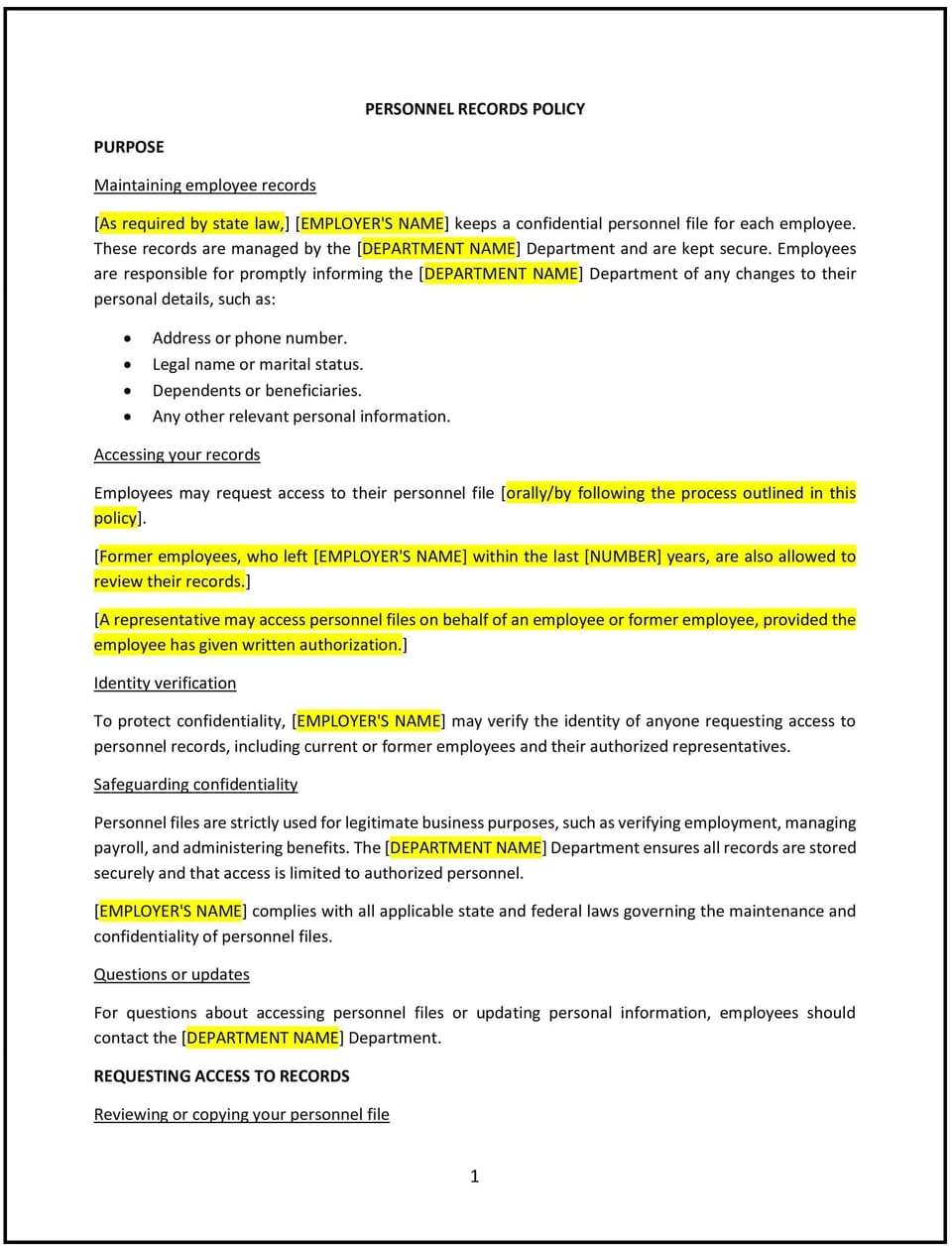Personnel records policy (Florida): Free template

Personnel records policy (Florida)
A personnel records policy helps Florida businesses establish guidelines for managing and maintaining employee records. This policy outlines procedures for collecting, storing, accessing, and disposing of personnel records while ensuring accuracy, confidentiality, and operational efficiency. It is designed to promote transparency, reduce risks, and provide clear expectations for handling employee records.
By implementing this policy, businesses in Florida can demonstrate their commitment to ethical practices, enhance operational efficiency, and align with the state’s focus on fostering a fair and transparent workplace.
How to use this personnel records policy (Florida)
- Define personnel records: Clearly specify what types of documents are considered personnel records, such as employment applications, performance evaluations, and disciplinary records.
- Establish collection procedures: Outline how businesses should collect and document personnel records, including consent requirements and retention periods.
- Address storage requirements: Explain how businesses should store personnel records securely, including physical and digital storage methods.
- Specify access limitations: Provide guidelines on who can access personnel records and under what circumstances, ensuring confidentiality and privacy.
- Communicate the policy: Share the policy with employees during onboarding and through regular communications to ensure awareness and understanding.
- Monitor adherence: Regularly review how the policy is applied and address any concerns or discrepancies promptly.
- Update the policy: Periodically assess the policy to reflect changes in workplace dynamics, legal standards, or business needs.
Benefits of using this personnel records policy (Florida)
This policy offers several advantages for Florida businesses:
- Promotes transparency: Clear guidelines help ensure that all personnel records are managed consistently and transparently.
- Reduces risks: Defined procedures minimize the likelihood of errors, unauthorized access, or reputational damage.
- Builds trust: Demonstrates the business’s commitment to ethical practices and employee well-being.
- Aligns with community values: Reflects Florida’s emphasis on fairness, transparency, and mutual respect in the workplace.
- Enhances reputation: A robust policy showcases the business’s dedication to ethical practices and operational integrity.
- Improves decision-making: Helps businesses anticipate potential risks and incorporate safeguards into personnel records management.
- Supports growth: A strong framework for managing personnel records fosters a culture of accountability and continuous improvement.
Tips for using this personnel records policy (Florida)
- Communicate clearly: Ensure employees understand the policy by providing written materials and discussing it during meetings or training sessions.
- Train employees: Educate staff on recognizing personnel records issues, understanding the policy, and following procedures.
- Use technology: Leverage tools like document management software to store, access, and manage personnel records securely.
- Stay informed: Keep up with changes in employment laws, regulations, or best practices that may affect personnel records management.
- Encourage feedback: Solicit input from employees to identify areas for improvement and ensure the policy meets their needs.
- Review periodically: Assess the policy’s effectiveness and make updates as needed to reflect changes in workplace dynamics or business goals.
Q: Why should Florida businesses adopt a personnel records policy?
A: Businesses should adopt this policy to promote transparency, reduce risks, and demonstrate their commitment to ethical practices regarding personnel records management.
Q: What types of documents should be considered personnel records?
A: Businesses should consider documents such as employment applications, performance evaluations, disciplinary records, and other relevant employment-related documents.
Q: How should businesses handle the collection of personnel records?
A: Businesses should collect personnel records only with explicit consent and maintain clear documentation of the consent process and data usage.
Q: Should businesses limit who can access personnel records?
A: Businesses should restrict access to personnel records to authorized personnel only, ensuring that access is granted based on job requirements and necessity.
Q: What should businesses do if a personnel record is inaccurate?
A: Businesses should address inaccuracies promptly by correcting the records, documenting the changes, and notifying affected employees as necessary.
Q: How can businesses ensure fairness in managing personnel records?
A: Businesses should apply the policy consistently across all employees, ensuring that decisions are based on objective criteria and documented evidence.
Q: How often should businesses review the policy?
A: Businesses should review the policy annually or whenever there are significant changes in workplace dynamics, legal standards, or business operations.
This article contains general legal information and does not contain legal advice. Cobrief is not a law firm or a substitute for an attorney or law firm. The law is complex and changes often. For legal advice, please ask a lawyer.


